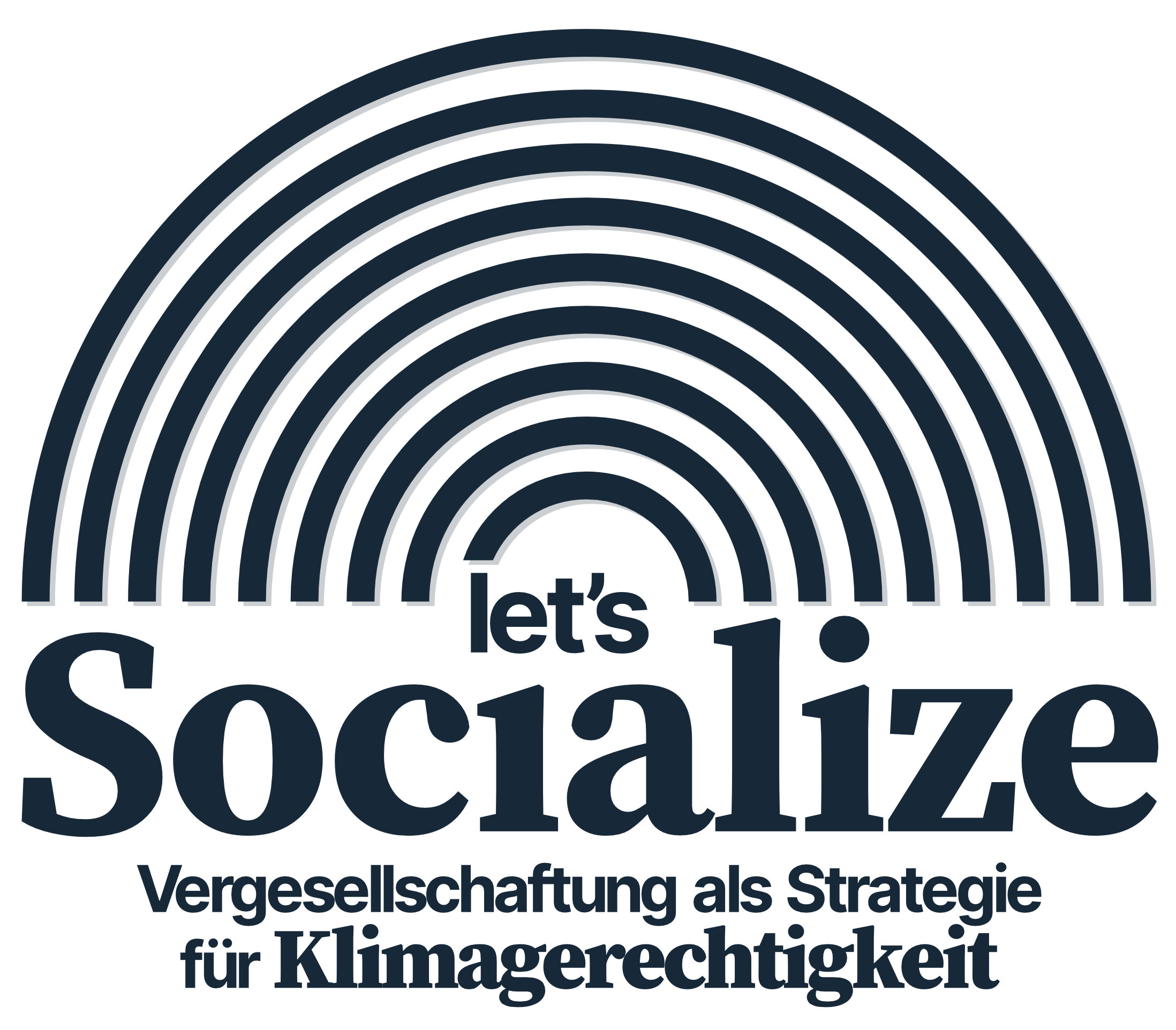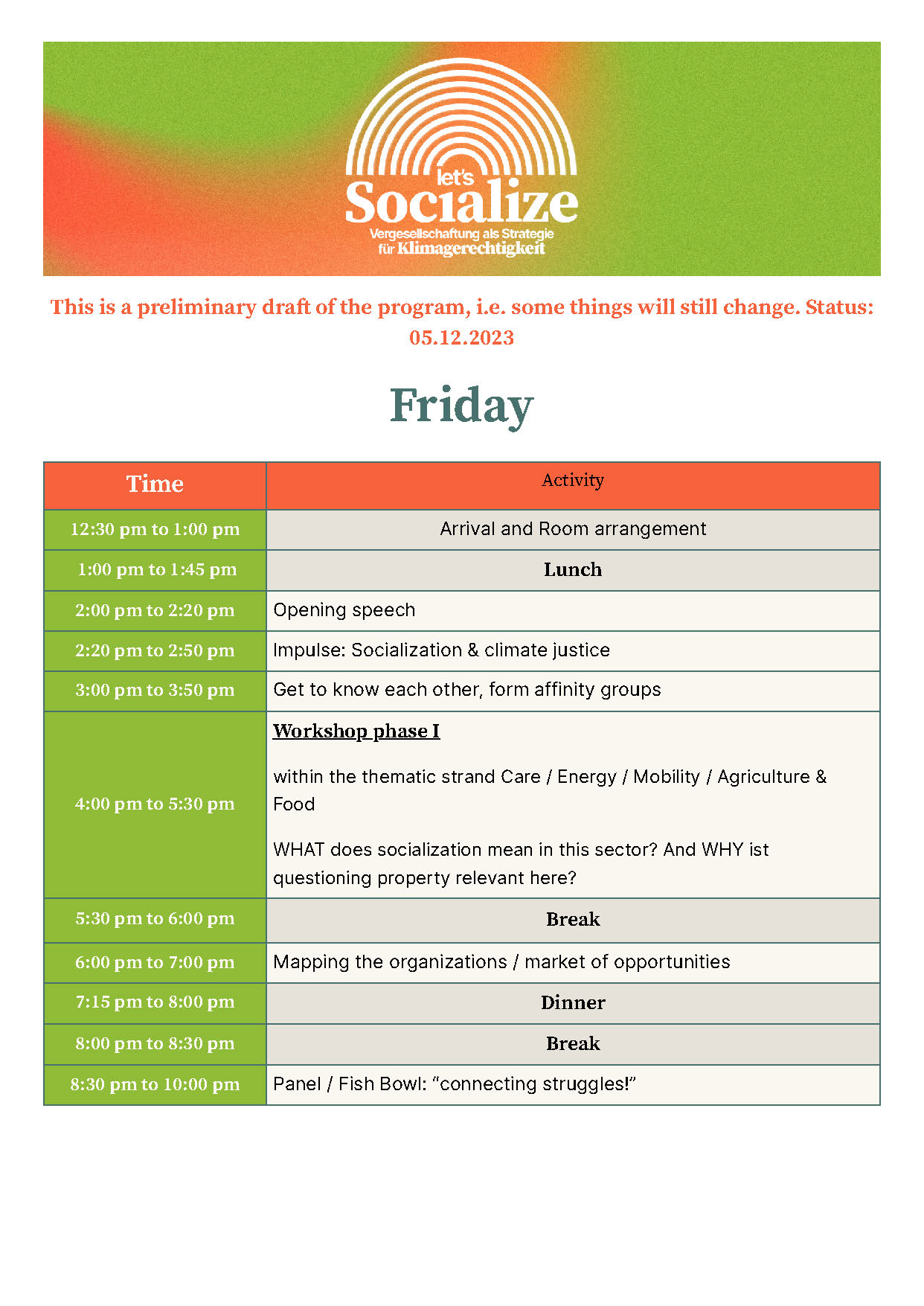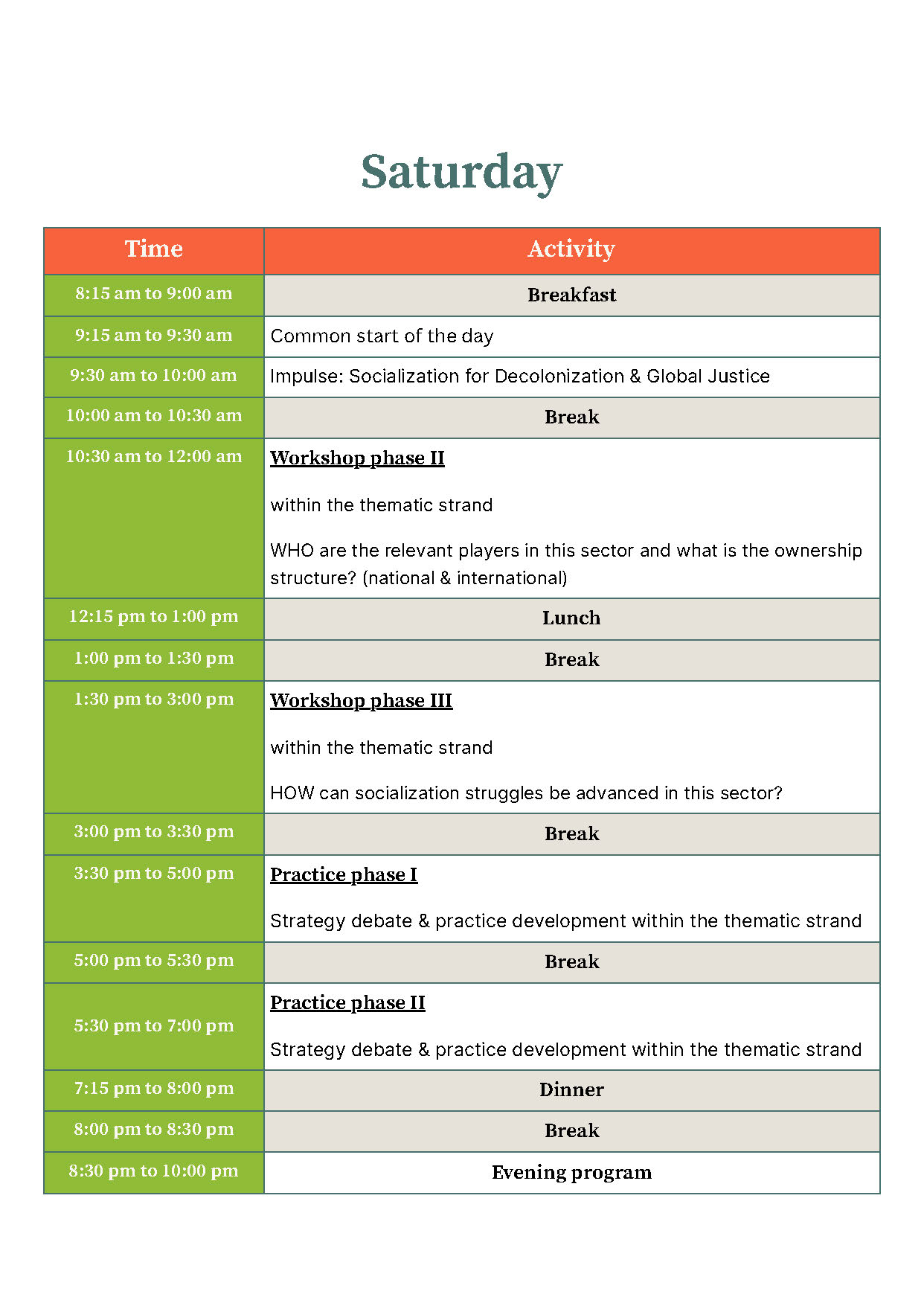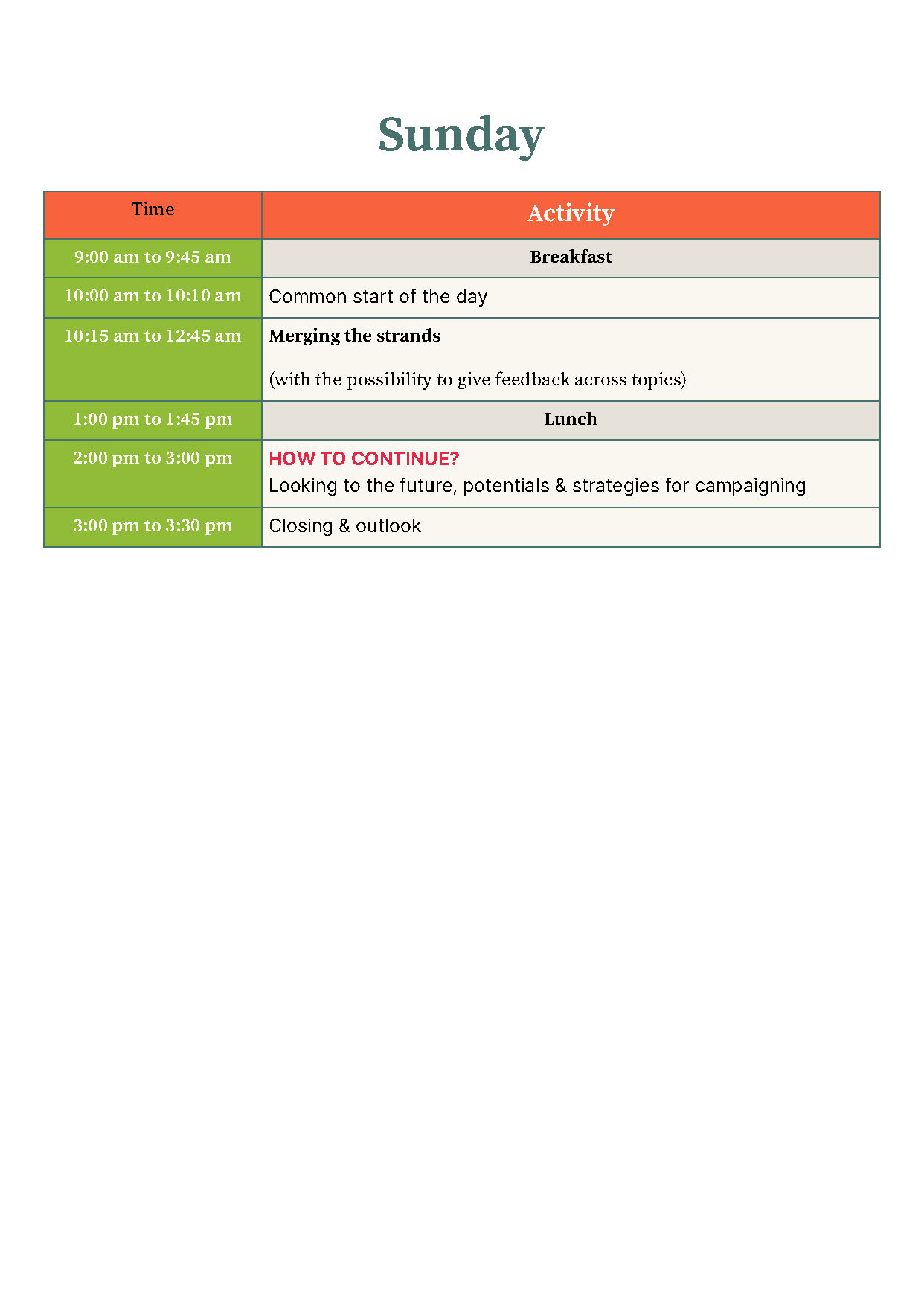The program
We invite you to the “Let’s socialize” conference in March 2024 at Werbellinsee!
As the climate justice movement, we want to come together to talk about how socialisation can be a strategy for achieving climate justice. The strategy meeting will provide space for 360 activists, pioneers and climate activists to discuss the potential of socialization for climate justice struggles and to develop concrete ideas for practice.
Back in October 2022, we raised the importance of socialisation and brought it into various economic sectors. Now – in spring 2024 – we are focusing on the role of socialisation as a lever for climate justice! What role does socialisation have to play in the transformation of key economic sectors and areas towards a just, ecological and democratic society?
What could climate-just socialisation look like in the energy sector, in agriculture and land use, in the area of mobility and in the care sector? What could climate-friendly socialization look like in the energy sector, in the agricultural and food sector, in mobility and in care contexts?
From 15 to 17 March we will be meeting to organise ourselves. We will develop campaigns for each of the four topics – mobility, care, agriculture & nutrition, energy. We invite you to join us!
We will be spending three days discussing and planning in workshops and panel discussions in one of the four thematic areas of mobility, care, energy or agriculture & soil – but of course we will also be eating, dreaming and taking breaks together. Friday and Saturday morning will be centred around theory and examples of successful campaigns. We would like to learn from and with the relevant social movements. Saturday and Sunday we will be getting into action! In the campaign workshops we will be making plans; for example, which field will be occupied next or how we can rebuild VW, expropriate Asklepios and take action against RWE, e.on and co.
The program lives from and with you! That’s why we also ask here in the registration form which of the four topics (energy, agriculture & nutrition, mobility, care) you are interested in. At Werbellinsee you will be primarily working with other activists from this area.
Let’s socialize! See you at Werbellinsee!
The question of property and ownership can be discussed in regards to almost everything – but we have to start somewhere. For this conference, we have selected four areas of society that are crucial for a social- and ecological-just future for all.
Mobility
Mobility is a fundamental right! And yet people – in Germany and worldwide – still only have inequitable access to it. How is it possible that the car lobby can assert its interests at the expense of people and nature? And what would a system of rail transport look like that is actually oriented towards needs rather than profit? In the workshop phases, we will first look at current approaches to the socialisation of the railways, the automobile industry and mobility platforms. We will take a look at the North-South impact of German transport companies and learn from successful campaigns. In the strategy phase, we will discuss together where the most important issues are: which levers we want to set in motion and which strategies we want to pursue in relation to which industry. The central challenge for climate-friendly, socialised mobility will be to consider the different needs of users and employees in Europe and around the world.
Care
How is care work linked to the climate justice movement and vice versa? And how can we socialise care work in hospitals, care services, in families and neighbourhoods in a climate-friendly way? There is already a lot that we can draw on: Experiments in caring, solidarity-based cities, (re)appropriation of care facilities and self-organised, cooperative care practices. Based on existing practices, projects and campaigns, we want to develop ideas for collective actions.
Agriculture and nutrition
If we want to look at climate justice from the root, then the land, soil and food issue must not be left out. The soil on which we stand, which nourishes us and many other living beings, is the basis of all life. But the capitalist system plays with our food, speculates on land and soil, profits from the labor of many (small) farmers and exploits animals. The result: an increasing concentration of property in the hands of a very small number of owners and the increasing destruction and exploitation of people, animals and the environment. Our strategy: socialization! We will look at the ownership structures in agriculture and current political levers around land policy and the animal industry in order to jointly explore the potential for socialization. To this end, we want to reappraise the past by looking at East German agricultural history with its forced expropriations and collectivizations (LPGs) in the GDR and learn from strong international and feminist agroecological movements. We want to build bridges between town and country, defend soils, develop “good food for all” and a radical practice!
Energy
The socialisation of the energy sector is just as central and urgent for a climate-friendly transformation as it is controversial and complex. There is hardly any other sector that relies so heavily on the continuation of fossil destruction, is so intransparent in its composition of different areas and players and has such a high level of influence on politics, the economy and society. Over three workshop phases, we want to address fundamental questions in this context: In which sub-sectors can socialisation be meaningfully applied – from the large electricity and gas suppliers, to the electricity grids and the rise of renewable energies in their diverse forms of ownership, to lignite and the associated legacy issue? Which players need to be focussed on? How can a democratisation of energy production and distribution be negotiated in a global perspective? In two practical phases, we want to use existing campaigns, activist struggles and alternative approaches to look ahead together in order to formulate strategic objectives for the socialisation of our energy.
